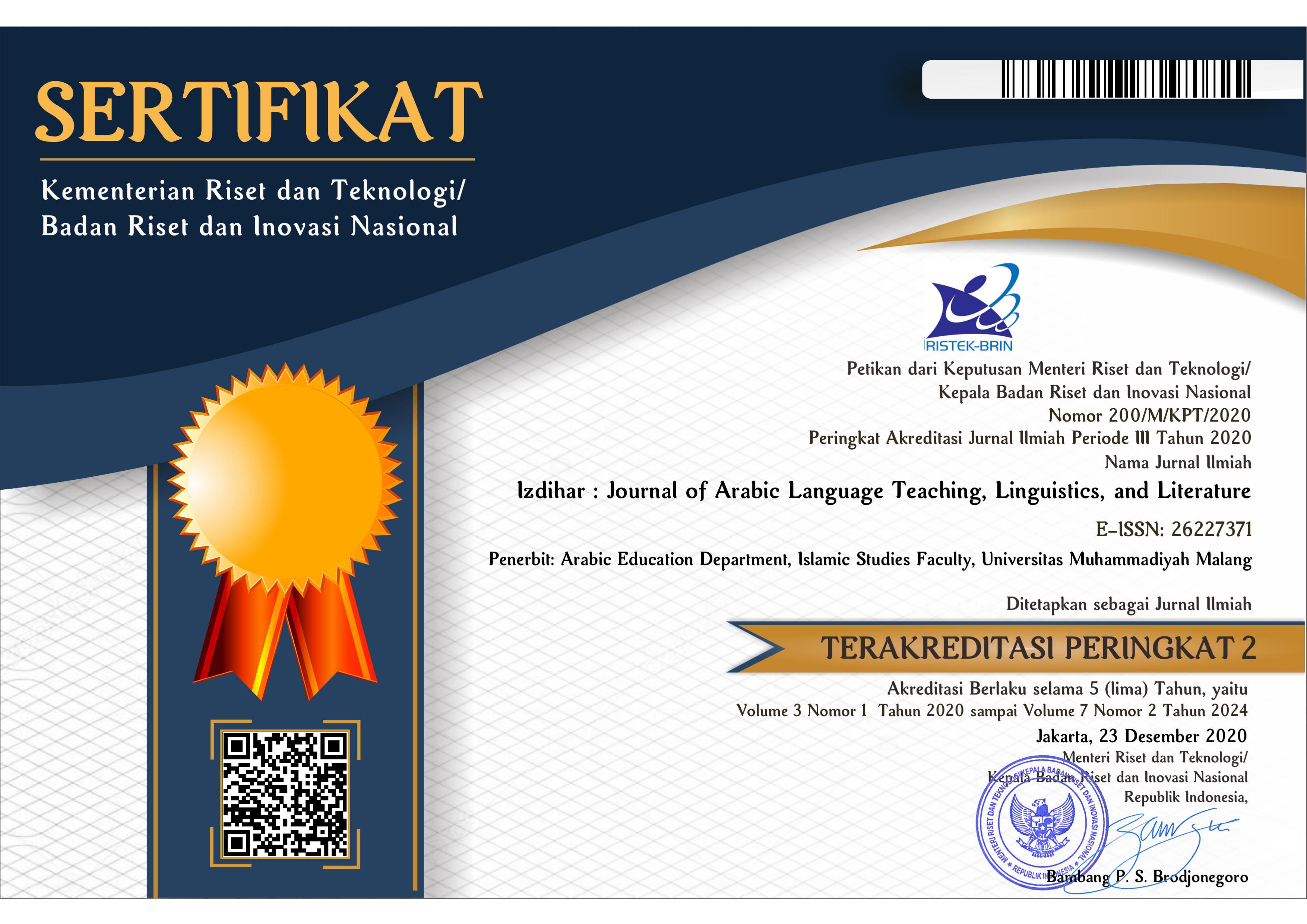Developing Arabic Language Instructional Content in Canvas LMS for the Era and Post Covid-19 Pandemic
DOI:
https://doi.org/10.22219/jiz.v3i3.15017Keywords:
Canvas, Covid-19, ICT, Instructional Content, LMS, mE-BookAbstract
Online and offline learning practices must not ignore pedagogy, psychology, technology, instructional content, and other aspects of teaching and learning process. Instructional content needs more attention during and after Covid-19 pandemic because it must match the characteristics of students. Therefore, this problem has led to the development of mE-Book for Arabic learning in Canvas Learning Management System (LMS). This research aimed to investigate the effectiveness of mE-Book as instructional content for Arabic language learning in Canvas LMS and the extent of mE-Book acceptance by students in the framework of the Technology Acceptance Model (TAM) 3. This research used a nonrandomized control group pretest-posttest design by comparing two groups with and without mE-Book and the interview to know the students’ point of view about mE-Book. The results showed that mE-Book was effective as instructional content for Arabic language learning in Canvas LMS with large effect based on effect size criteria. Students’ perspectives showed that the use of mE-Book as instructional content for Arabic language learning in Canvas LMS is interesting for online and offline learning. In conclusion, students could accept mE-Book in learning activity in Canvas LMS because it eased students in Arabic language learning.
Downloads
References
Afifah, N., Fauzi, M. F., Anindiati, I., & Nurdianto, T. (2020). The Implementation of Mimicry Memorization Method for Novice Students in Learning Arabic Mufradat. Jurnal Al Bayan: Jurnal Jurusan Pendidikan Bahasa Arab, 12(2), 263–280. https://doi.org/10.24042/albayan.v12i2.5953
Alshenqeeti, H. (2014). Interviewing as a Data Collection Method: A Critical Review. English Linguistics Research, 3(1). https://doi.org/10.5430/elr.v3n1p39
Alwan, M. (2018). Pengembangan Multimedia E-Book 3D Berbasis Mobile Learning Untuk Mata Pelajaran Geografi SMA Guna Mendukung Pembelajaran Jarak Jauh. At-Tadbir: Jurnal Manajemen Pendidikan Islam, 2(1), 26–40. https://doi.org/10.3454/at-tadbir.v1i2.3009
Annamalai, S. (2016). Designing motivating mE-book for polytechnic language classroom using ARCS model. The European Proceedings of Social & Behavioral Sciences XIV, 320–326. https://doi.org/10.15405/epsbs.2016.08.45
Baldwin, S. J., & Ching, Y.-H. (2019). Online course design: A review of the Canvas course evaluation checklist. International Review of Research in Open and Distributed Learning, 20(3), 269–282. https://doi.org/10.19173/irrodl.v20i3.4283
Brudermann, C. A. (2015). Computer-Mediated Online Language Learning Programmes vs. Tailor-Made Teaching Practices at University Level: A Foul Relationship or a Perfect Match? Open Learning, 30(3), 267–281. https://doi.org/10.1080/02680513.2015.1100069
Chang, M. M. (2007). Enhancing web-based language learning through self-monitoring. Journal of Computer Assisted Learning, 23(3), 187–196. https://doi.org/10.1111/j.1365-2729.2006.00203.x
De Paepe, L., Zhu, C., & Depryck, K. (2018). Online Dutch L2 learning in Adult Education: Educators’ and Providers’ Viewpoints on Needs, Advantages and Disadvantages. Open Learning, 33(1), 18–33. https://doi.org/10.1080/02680513.2017.1414586
Dong, C., Cao, S., & Li, H. (2020). Young children’s online learning during COVID-19 pandemic: Chinese parents’ beliefs and attitudes. Children and Youth Services Review, 118, 105440. https://doi.org/10.1016/j.childyouth.2020.105440
Endozo, A. N., Oluyinka, S., & Daenos, R. G. (2019). Teachers’ Experiences towards Usage of Learning Management System: CANVAS. Proceedings of the 2019 11th International Conference on Education Technology and Computers, 91–95. https://doi.org/https://doi.org/10.1145/3369255.3369257
Falcone, K. (2018). A Case Study of Faculty Experience and Preference of Using Blackboard and Canvas LMS (pp. 1–198). pp. 1–198. University of Phoenix.
Fansury, A. H., Januarty, R., & Ali Wira Rahman, S. (2020). Digital content for millennial generations: Teaching the English foreign language learner on COVID-19 pandemic. Journal of Southwest Jiaotong University, 55(3). https://doi.org/10.35741/issn.0258-2724.55.3.40
Fathema, N., & Akanda, M. H. (2020). Effects of instructors’ academic disciplines and prior experience with learning management systems: A study about the use of Canvas. Australasian Journal of Educational Technology, 36(4), 113–125. https://doi.org/10.14742/AJET.5660
Fauzi, M. F., Fatoni, A., & Anindiati, I. (2020). Pelatihan Peningkatan Kualitas Evaluasi Pembelajaran Bahasa Arab Berbasis Information Dan Communication Technology (ICT). Jurnal Terapan Abdimas, 5(2), 173–181. https://doi.org/10.25273/jta.v5i2.5620
Fauzi, M. F., & Anindiati, I. (2019). Tathwir al-Lughaz al-Raqmy li Madah al-Tathbiq Al-Sharfy 1 ‘ala al-Hatif al-Mahmul ka al-Tadribat al-Idhafiyyah Kharij al-Fashl al-Dirasy. Buletin Al-Turas, 25(1), 129–139. https://doi.org/10.15408/bat.v25i1.11506
Fauzi, M. F., & Anindiati, I. (2020). E-Learning Pembelajaran Bahasa Arab. Malang: UMM Press.
Fauzi, M. F., Buhun, M. F., & Purwadi, A. (2019). The Influence of Teams Games Tournament (TGT) toward Students’ Interest in Arabic Language Learning. Izdihar: Journal of Arabic Language Teaching, Linguistics, and Literature, 2(2), 135–148. https://doi.org/10.22219/jiz.v2i2.9986
Fauzi, M. F., Salahuddin, H., & Mauludiyah, L. (2020). The Effectiveness of Arabic Video Animation in Improving the Mastery of Arabic Vocabulary. International Journal of Arabic Language Teaching, 2(2), 149–161. https://doi.org/10.32332/ijalt.v2i02.2499
Fitriyah, T., & Fauzi, M. F. (2020). Improving Quality of Arabic Translation Course through Jigsaw Cooperative Learning. Izdihar: Journal of Arabic Language Teaching, Linguistics, and Literature, 3(1). https://doi.org/10.22219/jiz.v3i1.11033
Foster, I. (2019). The Future of Language Learning. Language, Culture and Curriculum, 32(3), 261–269. https://doi.org/10.1080/07908318.2019.1661154
Furqon, M. R., & Fauzi, M. F. (2019). The Values of Educational Character in the Arabic Temples of Qasidah Burdah by Imam Bushiri. Izdihar: Journal of Arabic Language Teaching, Linguistics, and Literature, 2(1), 67–76. https://doi.org/10.22219/jiz.v2i1.8327
Hanafi, Y., Murtadho, N., Ikhsan, M. A., & Diyana, T. N. (2020). Reinforcing Public University Student’s Worship Education by Developing and Implementing Mobile-Learning Management System in the ADDIE Instructional Design Model. International Journal of Interactive Mobile Technologies (IJIM), 14(02), 215–241. https://doi.org/10.3991/ijim.v14i02.11380
Hanafi, Y., Murtadho, N., Ikhsan, M. A., Diyana, T. N., & Sultoni, A. (2019). Student’s and Instructor’s Perception toward the Effectiveness of E-BBQ Enhances Al-Qur’an Reading Ability. International Journal of Instruction, 12(3), 51–68. https://doi.org/10.29333/iji.2019.1234a
Hubackova, S. (2014). Motivation in eLearning Motivation in language courses. Procedia-Social and Behavioral Sciences, 122, 353–356. https://doi.org/10.1016/j.sbspro.2014.01.1353
Hubackova, S., & Klimova, B. F. (2013). Pedagogical aspects of eLearning. Language on-line course and issues of learning styles. Procedia-Social and Behavioral Sciences, 93, 1095–1098. https://doi.org/10.1016/j.sbspro.2013.09.337
Hubackova, S., & Semradova, I. (2015). Language skills as eLearning course contents. Procedia-Social and Behavioral Sciences, 182, 51–54. https://doi.org/10.1016/j.sbspro.2015.04.736
Leedy, P. D., Ormrod, J. E., & L R Johnson. (2019). Practical Research: Planning and Design (Twelfth edition) (12th ed.). NY: Pearson.
Lune, H., & Berg, B. L. (2017). Qualitative Research Methods for the Social Sciences (Ninth Edition). Boston: Pearson.
Marachi, R., & Quill, L. (2020). The case of Canvas: Longitudinal datafication through learning management systems. Teaching in Higher Education, 25(4), 418–434. https://doi.org/10.1080/13562517.2020.1739641
Martínez-Torres, M. del R., Toral, S. L., & Barrero, F. (2011). Identification of the design variables of eLearning tools. Interacting with Computers, 23(3), 279–288. https://doi.org/10.1016/j.intcom.2011.04.004
Merriam, S. B. (1998). Qualitative Research and Case Study Applications in Education. Revised and Expanded from" Case Study Research in Education.". (2nd Editio). San Fransisco: Jossey-Bass Publishers.
Mpungose, C. B., & Khoza, S. B. (2020). Postgraduate Students’ Experiences on the Use of Moodle and Canvas Learning Management System. Technology, Knowledge and Learning, 1–16. https://doi.org/10.1007/s10758-020-09475-1
Mulyadi, M., Atmazaki, A., & Syahrul, R. (2019). The Development of Interactive Multimedia E-Module on Indonesia Language Course. 1st International Conference on Innovation in Education (ICoIE 2018), 291–295. https://doi.org/10.2991/icoie-18.2019.65
Paynter, K., & Barnes, J. (2019). Moving from Blackboard to Canvas: What the Research Says, Plus Two Professors’ Experiences. E-Learn: World Conference on E-Learning in Corporate, Government, Healthcare, and Higher Education, 1314–1320. https://www.learntechlib.org/p/211220/
Popovici, A., & Mironov, C. (2015). Students’ perception on using eLearning technologies. Procedia-Social and Behavioral Sciences, 180, 1514–1519. https://doi.org/10.1016/j.sbspro.2015.02.300
Rienties, B., Lewis, T., McFarlane, R., Nguyen, Q., & Toetenel, L. (2018). Analytics in Online and Offline Language Learning Environments: The Role of Learning Design to Understand Student Online Engagement. Computer Assisted Language Learning, 31(3), 273–293. https://doi.org/10.1080/09588221.2017.1401548
Riyanta, B., Hamid, E. S., Prasetyo, H., Hamid, H., Khair, H., Ahmad, J., … Siswanto, W. A. (2020). Pembelajaran Daring PTMA di Masa Pandemi Covid-19 (Edisi Pertama; E. S. Hamid & M. Khalil, Eds.). Yogyakarta: Majelis Diktilitbang PP Muhammadiyah.
Rojas, L. F. M., & Jaimes, N. M. (2020). Canvas LMS and Collaborative work as a learning methodology in virtual environments. 2020 15th Iberian Conference on Information Systems and Technologies (CISTI), 1–6. IEEE.
Rusman, R., Deni Kurniawan, & Riyana, C. (2013). Pembelajaran Berbasis Teknologi Informasi dan Kamunikasi: Mengembangkan Profesionalitas Guru. Jakarta: Rajawali Press.
Song, Y. N., & Luan, Z. Q. (2020). Function Design Optimization of Learning Management System (LMS) Based on Student Perspective—Case Study of Canvas Application University of Colorado Denver. Journal of Physics: Conference Series, 1621(1), 1–5. IOP Publishing.
Towne, T. (2018). Exploring the Phenomenon of Secondary Teachers Integrating the LMS Canvas in a Blended-Learning Course. Liberty University.
Venkatesh, V., & Bala, H. (2008). Technology Acceptance Model 3 and a Research Agenda on Interventions. Decision Sciences, 39(2), 273–315. https://doi.org/10.1111/j.1540-5915.2008.00192.x
www.trustradius.com. (2020). Feature Rating Comparison Canvas, Google Classroom, and Moodle. Date accessed 26/12/2020.
Zhang, R., & Zou, D. (2020). Types, Purposes, and Effectiveness of State-of-the-art Technologies for Second and Foreign Language Learning. Computer Assisted Language Learning, 0(0), 1–47. https://doi.org/10.1080/09588221.2020.1744666
Downloads
Published
How to Cite
Issue
Section
License
Copyright (c) 2020 Moh. Fery Fauzi, Murdiono Murdiono, Irma Anindiati, Auqi Lu'lu In Nada, Rifqi Rohmanul Khakim, Lailatul Mauludiyah, I'anatut Thoifah

This work is licensed under a Creative Commons Attribution-ShareAlike 4.0 International License.
Copyright Notice
Authors who publish with this journal agree to the following terms:
- Authors retain copyright and grant the journal right of first publication with the work simultaneously licensed under a Creative Commons Attribution-ShareAlike 4.0 International License that allows others to share the work with an acknowledgment of the work's authorship and initial publication in this journal.
- Authors are able to enter into separate, additional contractual arrangements for the non-exclusive distribution of the journal's published version of the work (e.g., post it to an institutional repository or publish it in a book), with an acknowledgment of its initial publication in this journal.
- Authors are permitted and encouraged to post their work online (e.g., in institutional repositories or on their website) prior to and during the submission process, as it can lead to productive exchanges, as well as earlier and greater citation of published work (See The Effect of Open Access).
Copyright (c) 2019 Izdihar : Journal of Arabic Language Teaching, Linguistics, and Literature

This work is licensed under a Creative Commons Attribution-ShareAlike 4.0 International License.


















